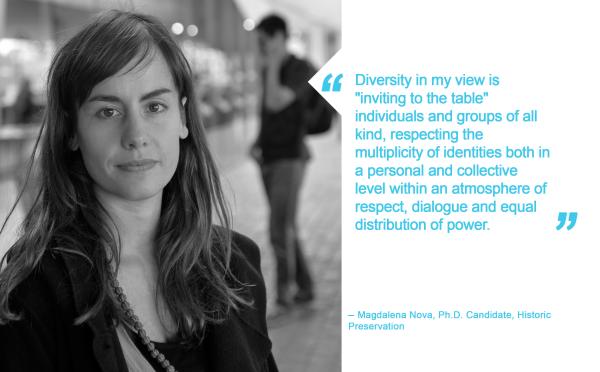Magdalena Novoa, Student

Magdalena holds a Bachelor degree in Fine Arts and another one in Arts Education from Universidad Católica de Chile. She also has an MA degree in Arts and Cultural Management from the University of Arts London. At UT School of Architecture, Magda is investigating the social and political aspects involved in the production of cultural heritage in Latin America, specifically heritage grassroots movements and the politics of memory in Chile. She is analyzing three historic preservation grassroots movements in Chile.
In the School, what degree are you seeking? What year are you in?
I'm a Ph.D. Candidate in the Historic Preservation program.
In what ways have you incorporated diversity and equity issues as part of your educational experience?
Diversity and equity are central to my work and my educational experience. In relation to my research, I understand heritage not as a "thing" but rather as a cultural process that produces and reproduces established power relations in our environments. Within that notion, my research investigates the role of historic preservation in perpetuating exclusion and inequality in different contexts in Chile. I trace how heritage and human rights activists use heritage-making to work against established forms of inequalities and create new spaces of citizenship and distribution of cultural and political rights. In this context, I spent 9 months in Chile undertaking ethnographic work and collaborating closely with different activist groups in Lota, Valparaíso, and organizations related to the memory site of Colonia Dignidad. Both in my role as a teaching assistant and as a student at UT I'm always aware of encouraging thinking critically about the cultural and social production of space and of resisting homogenous disciplinary identities.
What does diversity mean to you?
Diversity in my view is "inviting to the table" individuals and groups of all kind, respecting the multiplicity of identities both in a personal and collective level within an atmosphere of respect, dialogue and equal distribution of power. In an educational context such as the University, it means creating an environment where many people from many different backgrounds and life experiences have the opportunity to learn different ways of knowing with and from others.
Can you describe the sense of community at the School?
Our school is progressive in many aspects, particularly in the production of research that interrogates space and the built environment in a wide range of geographical and cultural contexts. As an international female student, I have always felt empowered to both learn and contribute to the welcoming environment that the school is. I'm in the historic preservation program and my research is very interdisciplinary, so I have found myself working at the intersection of Architectural History and Urban Planning where I've always felt integrated and supported by faculty and students from both departments within the school. Although there are still many challenges to fully achieve diversity and equity at the School, I think that we are taking important measures to incorporate more deeply those issues in teaching and research.
What are your aspirations –big or small– for the future?
I believe that one of the main issues in academia regarding diversity and inclusion is that intellectual production remains too distanced from the "real world". In this sense, I would like to work and teach in a place where community-based research is valued and encouraged and where I can contribute to bridging the gap between scholarly work and communities' needs. I would like to continue developing my research about planning, heritage, and memory in Chile and expand it to other places in the Americas.
